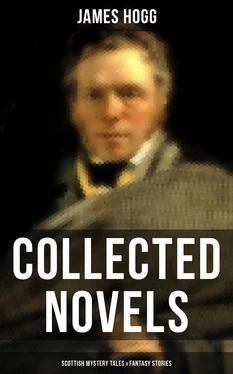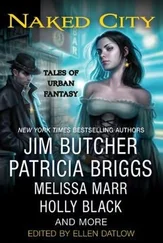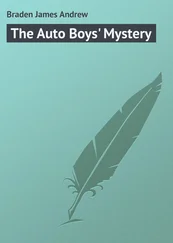But, to countervail this grievous offence, our saintly and afflicted dame, in due time, was safely delivered of a fine boy whom the laird acknowledged as his son and heir, and had him christened by his own name, and nursed in his own premises. He gave the nurse permission to take the boy to his mother’s presence if ever she should desire to see him; but, strange as it may appear, she never once desired to see him from the day that he was born. The boy grew up, and was a healthful and happy child; and, in the course of another year, the lady presented him with a brother. A brother he certainly was, in the eye of the law, and it is more than probable that he was his brother in reality. But the laird thought otherwise; and, though he knew and acknowledged that he was obliged to support and provide for him, he refused to acknowledge him in other respects. He neither would countenance the banquet nor take the baptismal vows on him in the child’s name; of course, the poor boy had to live and remain an alien from the visible church for a year and a day; at which time, Mr. Wringhim out of pity and kindness, took the lady herself as sponsor for the boy, and baptized him by the name of Robert Wringhim—that being the noted divine’s own name.
George was brought up with his father, and educated partly at the parish school, and partly at home, by a tutor hired for the purpose. He was a generous and kind-hearted youth; always ready to oblige, and hardly ever dissatisfied with anybody. Robert was brought up with Mr. Wringhim, the laird paying a certain allowance for him yearly; and there the boy was early inured to all the sternness and severity of his pastor’s arbitrary and unyielding creed. He was taught to pray twice every day, and seven times on Sabbath days; but he was only to pray for the elect, and, like Devil of old, doom all that were aliens from God to destruction. He had never, in that family into which he had been as it were adopted, heard aught but evil spoken of his reputed father and brother; consequently he held them in utter abhorrence, and prayed against them every day, often “that the old hoary sinner might be cut off in the full flush of his iniquity, and be carried quick into hell; and that the young stem of the corrupt trunk might also be taken from a world that he disgraced, but that his sins might be pardoned, because he knew no better.”
Such were the tenets in which it would appear young Robert was bred. He was an acute boy, an excellent learner, had ardent and ungovernable passions, and, withal, a sternness of demeanour from which other boys shrunk. He was the best grammarian, the best reader, writer, and accountant in the various classes that he attended, and was fond of writing essays on controverted points of theology, for which he got prizes, and great praise from his guardian and mother. George was much behind him in scholastic acquirements, but greatly his superior in personal prowess, form, feature, and all that constitutes gentility in the deportment and appearance. The laird had often manifested to Miss Logan an earnest wish that the two young men should never meet, or at all events that they should be as little conversant as possible; and Miss Logan, who was as much attached to George as if he had been her own son, took every precaution, while he was a boy, that he should never meet with his brother; but, as they advanced towards manhood, this became impracticable. The lady was removed from her apartments in her husband’s house to Glasgow, to her great content; and all to prevent the young laird being tainted with the company of her and her second son; for the laird had felt the effects of the principles they professed, and dreaded them more than persecution, fire, and sword. During all the dreadful times that had overpast, though the laird had been a moderate man, he had still leaned to the side of kingly prerogative, and had escaped confiscation and fines, without ever taking any active hand in suppressing the Covenanters. But, after experiencing a specimen of their tenets and manner in his wife, from a secret favourer of them and their doctrines, he grew alarmed at the prevalence of such stern and factious principles, now that there was no check or restraint upon them; and from that time he began to set himself against them, joining with the Cavalier party of that day in all their proceedings.
It so happened that, under the influence of the Earls of Seafield and Tullibardine, he was returned for a Member of Parliament in the famous session that sat at Edinburgh when the Duke of Queensberry was commissioner, and in which party spirit ran to such an extremity. The young laird went with his father to the court, and remained in town all the time that the session lasted; and, as all interested people of both factions flocked to the town at that period, so the important Mr. Wringhim was there among the rest, during the greater part of the time, blowing the coal of revolutionary principles with all his might, in every society to which he could obtain admission. He was a great favourite with some of the west country gentlemen of that faction, by reason of his unbending impudence. No opposition could for a moment cause him either to blush, or retract one item that he had advanced. Therefore the Duke of Argyle and his friends made such use of him as sportsmen often do of terriers, to start the game, and make a great yelping noise to let them know whither the chase is proceeding. They often did this out of sport, in order to tease their opponent; for of all pesterers that ever fastened on man he was the most insufferable: knowing that his coat protected him from manual chastisement, he spared no acrimony, and delighted in the chagrin and anger of those with whom he contended. But he was sometimes likewise of real use to the heads of the Presbyterian faction, and therefore was admitted to their tables, and of course conceived himself a very great man.
His ward accompanied him; and, very shortly after their arrival in Edinburgh, Robert, for the first time, met with the young laird his brother, in a match at tennis. The prowess and agility of the young squire drew forth the loudest plaudits of approval from his associates, and his own exertion alone carried the game every time on the one side, and that so far as all I along to count three for their one. The hero’s name soon ran round the circle, and when his brother Robert, who was an onlooker, learned who it was that was gaining so much applause, he came and stood close beside him all the time that the game lasted, always now and then putting in a cutting remark by way of mockery.
George could not help perceiving him, not only on account of his impertinent remarks, but he, moreover, stood so near him that he several times impeded him in his rapid evolutions, and of course got himself shoved aside in no very ceremonious way. Instead of making him keep his distance, these rude shocks and pushes, accompanied sometimes with hasty curses, only made him cling the closer to this king of the game. He seemed determined to maintain his right to his place as an onlooker, as well as any of those engaged in the game, and, if they had tried him at an argument, he would have carried his point; or perhaps he wished to quarrel with this spark of his jealousy and aversion, and draw the attention of the gay crowd to himself by these means; for, like his guardian, he knew no other pleasure but what consisted in opposition. George took him for some impertinent student of divinity, rather set upon a joke than anything else. He perceived a lad with black clothes, and a methodistical face, whose countenance and eye he disliked exceedingly, several times in his way, and that was all the notice he took of him the first time they two met. But the next day, and every succeeding one, the same devilish-looking youth attended him as constantly as his shadow; was always in his way as with intention to impede him and ever and anon his deep and malignant eye met those of his elder brother with a glance so fierce that it sometimes startled him.
Читать дальше












